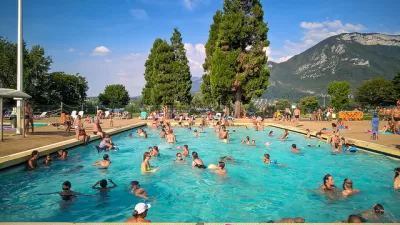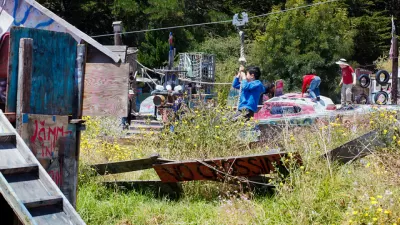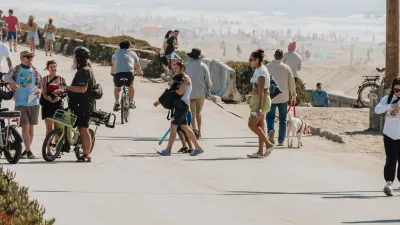As more and more children are kept in homes and yards, Joe Cortright worries about the effects of private play on American culture and public spaces.

"Changes in technology, the economy and society have all coalesced to create more fragmentation and division," Joe Cortright writes in City Observatory. This separation also affects children, Cortright argues, "instead of going to public parks and playgrounds, more children play in the copious backyards of suburban homes. This trend is amplified by helicopter parents."
As evidence of this growing separation, Cortright points to pools. In the first part of the 20th century, private pools were almost unheard of, now there are over 5 million. "The number of persons who belong to private gyms has increased from about 13 million in 1981 to more than 50 million," Cortright points out.
He goes on to say, "Public parks are one of the places where people of different races, ethnicities and incomes can come together and share experiences." As more people look to entertain themselves in private, these spaces may lose something important.
FULL STORY: New York Is Blowing The Kosciuszko Bridge Straight To Hell

Trump Administration Could Effectively End Housing Voucher Program
Federal officials are eyeing major cuts to the Section 8 program that helps millions of low-income households pay rent.

Planetizen Federal Action Tracker
A weekly monitor of how Trump’s orders and actions are impacting planners and planning in America.

The 120 Year Old Tiny Home Villages That Sheltered San Francisco’s Earthquake Refugees
More than a century ago, San Francisco mobilized to house thousands of residents displaced by the 1906 earthquake. Could their strategy offer a model for the present?

HSR Reaches Key Settlement in Northern California City
The state’s high-speed rail authority reached an agreement with Millbrae, a key city on the train’s proposed route to San Francisco.

Washington State Legislature Passes Parking Reform Bill
A bill that would limit parking requirements for new developments is headed to the governor’s desk.

Missouri Law Would Ban Protections for Housing Voucher Users
A state law seeks to overturn source-of-income discrimination bans passed by several Missouri cities.
Urban Design for Planners 1: Software Tools
This six-course series explores essential urban design concepts using open source software and equips planners with the tools they need to participate fully in the urban design process.
Planning for Universal Design
Learn the tools for implementing Universal Design in planning regulations.
Ada County Highway District
Clanton & Associates, Inc.
Jessamine County Fiscal Court
Institute for Housing and Urban Development Studies (IHS)
City of Grandview
Harvard GSD Executive Education
Toledo-Lucas County Plan Commissions
Salt Lake City
NYU Wagner Graduate School of Public Service




























